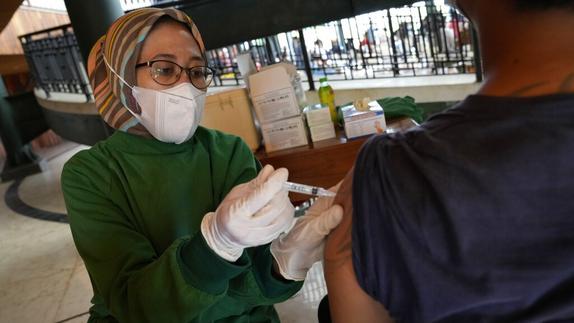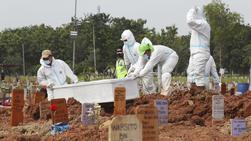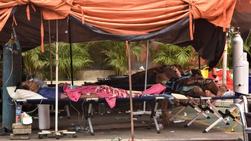 A health worker gives a shot of the Sinovac COVID-19 vaccine to a man during a mass vaccination in Jakarta, Indonesia, June 21, 2021. (DITA ALANGKARA / AP)
A health worker gives a shot of the Sinovac COVID-19 vaccine to a man during a mass vaccination in Jakarta, Indonesia, June 21, 2021. (DITA ALANGKARA / AP)
Indonesia must accelerate its vaccination program to curb one of Asia's worst COVID-19 outbreaks, public health experts said.
The world's fourth most populous nation aims to inoculate 208 million people by January. But as of Aug 30, only 17 percent of the target population has been fully vaccinated.
The pace of vaccination can barely cope with the fast-rising number of cases caused by the highly-transmissible Delta variant. SARS-CoV-2 has infected more than 4 million people in Indonesia, while the death toll has surpassed 131,000.
Health Minister Budi Gunadi Sadikin said the government is targeting to administer 50 million COVID-19 vaccine doses per month starting September to meet the target. But health experts said this might not be feasible given the insufficient supply of vaccines, poor infrastructure and lack of health workers.
Although Indonesia has seen generous amounts of vaccines arrive, at other times, short supplies have kept health workers waiting before they can inoculate people, said A'an Suryana, visiting fellow at the Singapore-based research center ISEAS-Yusof Ishak Institute
"We can set any (vaccination) target, but the problem is whether there is enough supply of vaccines that can be distributed around the country," said Tjandra Yoga Aditama, professor at the University of Indonesia's Faculty of Medicine.
More than 200 million COVID-19 vaccine doses had arrived in Indonesia by Aug 23, of which over 80 percent are from China's Sinovac Biotech. Most of the vaccines are delivered in bulk; Indonesia's state-owned pharmaceutical firm Bio Farma, partnering with Sinovac, processes and packages them. Sinopharm, AstraZeneca, Moderna and Pfizer also supply vaccines.
ALSO READ: Indonesia's COVID-19 cases surpass 4 million
But the delivery schedule of these vaccines varies, affecting the pace of Indonesia's vaccination program, according to A'an Suryana, visiting fellow at the Singapore-based research center ISEAS-Yusof Ishak Institute.
Although Indonesia has seen generous amounts of vaccines arrive, at other times, short supplies have kept health workers waiting before they can inoculate people, Suryana said.
The daily number of shots administered has been fluctuating. On July 14, a record 2.4 million doses were administered, Suryana said. On other days, less than one million jabs are given.
 Workers in protective gear lower a coffin of a COVID-19 victim for burial at the special section of the Pedurenan cemetery designated to accommodate the surge in deaths during the coronavirus outbreak in Bekasi, West Java, Indonesia on Aug. 12, 2021. (ACHMAD IBRAHIM / AP)
Workers in protective gear lower a coffin of a COVID-19 victim for burial at the special section of the Pedurenan cemetery designated to accommodate the surge in deaths during the coronavirus outbreak in Bekasi, West Java, Indonesia on Aug. 12, 2021. (ACHMAD IBRAHIM / AP)
Irma Hidayana, co-founder of Jakarta-based independent data monitoring group Lapor COVID-19, said "vaccine inequity" is undermining efforts to inoculate more people. She said that apart from the supply itself, how these vaccines were distributed and who should be vaccinated are of greater concern
Aditama of UI said most of the vaccinations are done in crowded stadiums and schools, which heightens the risk of contracting the virus. The government should instead open up more community health centers to reduce crowding and assure people that they will not be infected while waiting their turn.
Irma Hidayana, co-founder of Jakarta-based independent data monitoring group Lapor COVID-19, said "vaccine inequity" is undermining efforts to inoculate more people. She said that apart from the supply itself, how these vaccines were distributed and who should be vaccinated are of greater concern.
Several ranking officials in Indonesia have been criticized for getting a third dose of a vaccine while most of the country has not even received a first shot.
Military chief Hadi Tjahjanto and East Kalimantan Governor Isran Noor said during a meeting with Indonesian President Joko Widodo that they have received third jabs.
"This kind of irregularity needs to be halted," said Suryana of ISEAS-Yusof Ishak Institute, adding that the government has already said only health workers can have booster shots.
ALSO READ: Indonesia readies more ICU units after days of record deaths
 Patients suffering with COVID-19 are treated in a tent outside a hospital in Bekasi, Indonesia on July 14, 2021. (REZAS / AFP)
Patients suffering with COVID-19 are treated in a tent outside a hospital in Bekasi, Indonesia on July 14, 2021. (REZAS / AFP)
Suryana said protecting health workers is crucial given the Delta variant has decimated the already low number of vaccinators in Indonesia. He said the worsening pandemic has forced most health workers to leave their posts as vaccinators to focus on treating COVID-19 patients.
Health experts said Indonesia's poor health infrastructure has been weighed down by the pandemic and must be addressed by the government over the long term. According to the World Health Organization, there are only six hospital beds and one doctor for every 10,000 Indonesians
Indonesian authorities are addressing this problem by training more vaccinators. Harif Fadhillah, chairman of the Indonesian Nurses Association, said a total of 166,000 volunteers were trained to help the government accelerate the inoculation program, state news agency Antara reported. He said most of the volunteers are recent graduates of nursing schools and members of youth organizations.
Indonesia has also increased its 2021 health budget from the initial 87.55 trillion rupiah (US$6.11 billion) to 193.93 trillion rupiah in July to support more testing, contact tracing and treatment as well as to increase wages of health workers.
Health experts said Indonesia's poor health infrastructure has been weighed down by the pandemic and must be addressed by the government over the long term. According to the World Health Organization, there are only six hospital beds and one doctor for every 10,000 Indonesians.
READ MORE: Indonesia: COVID-19 deaths for unvaccinated over 3 times higher
"Even Jakarta was struggling when it was hit hard by the Delta variant," Suryana said, noting that health infrastructure in the capital is much better than the more remote areas of the country. Jakarta is located in Java – the most populous and developed island in Indonesia.
"They (other Indonesian regions) lack health workers, including doctors and nurses and also lack hospitals. So I can imagine that areas outside Java Island will be hit even harder by the spread of virus," he said.
Indonesian President Joko Widodo has acknowledged the need for health reforms and has proposed to parliament a 255 trillion rupiah health budget for 2022. He said this will finance the pandemic response and improve the healthcare system in the country, especially the primary care units.
Leonardus Jegho in Jakarta contributed to this story.
Contact the writer at prime@chinadailyapac.com


